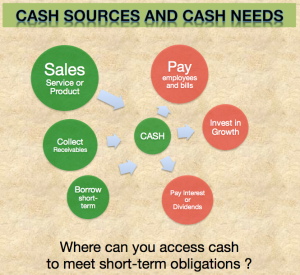The news from Greece is disturbing. While I highly doubt it’ll affect the U.S. I feel for those small businesses in Greece struggling to keep their doors open because they don’t have access  to cash to pay their employees, or buy inventory or maybe even pay the electric bill. They don’t have good access to cash to meet their short-term obligations. And while you don’t have a business in Greece, you certainly could face a liquidity crunch. The best time to think about your business’ liquidity is now when it’s not a problem. It’s like chess. If your opponent captures your king then the game is over. But, if your opponent captures your queen – it’s the beginning of the end of the game. In your business your cash is your king and your liquidity is your queen. Don’t just think about your cash – think about your liquidity.
to cash to pay their employees, or buy inventory or maybe even pay the electric bill. They don’t have good access to cash to meet their short-term obligations. And while you don’t have a business in Greece, you certainly could face a liquidity crunch. The best time to think about your business’ liquidity is now when it’s not a problem. It’s like chess. If your opponent captures your king then the game is over. But, if your opponent captures your queen – it’s the beginning of the end of the game. In your business your cash is your king and your liquidity is your queen. Don’t just think about your cash – think about your liquidity.
How much cash do you keep on hand for your business? And how much do you think you should keep? Are you on top of generating sales, collecting receivables and maintaining relationships if you need to borrow short-term? As the chart illustrates, your small business’ liquidity comes from your sales, your collection of receivables and ability to borrow short-term or attract investors.  You have to maintain strong liquidity which includes cash but it also means your ability to access cash quickly to meet short term obligations. For a small business this might mean your personal credit score is over 660, or that your relationship with your friends is strong and you might be able to pool money from them.
You have to maintain strong liquidity which includes cash but it also means your ability to access cash quickly to meet short term obligations. For a small business this might mean your personal credit score is over 660, or that your relationship with your friends is strong and you might be able to pool money from them.
How you plan to keep your business’ liquidity strong is about strategy and diligence. I remember doing an investment analysis on a Southern Calif supermarket that operates over 150 supermarkets. I noticed they had $100+ million in cash on the balance sheet which is a lot of cash to hold and not have working for the business. When I asked about it, their investment banker admitted it was high but that the company had once lost access to its ability to borrow short-term and the Chief Financial Officer never wanted that to happen again. It was a defensive strategy for sure but they are still in business so it’s working for them.
Your business will have a better chance at access to loans and investors if profits are good and operations are transparent. Keep your books pristine (financial statements) make sure your tax returns highly resemble your internal books and keep them easy to understand. This will pay off when times get more difficult because you’ll be in better shape than your competitors to access the cash you need.
